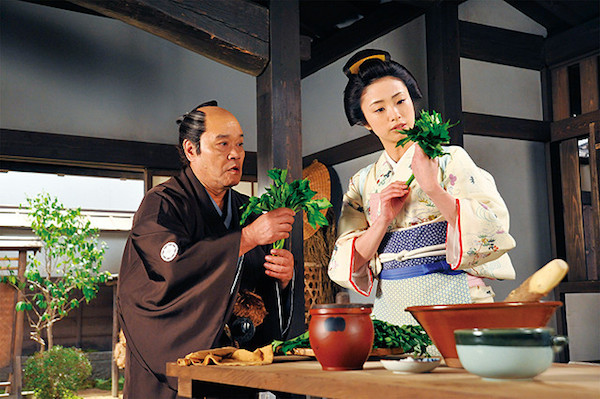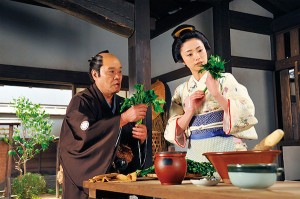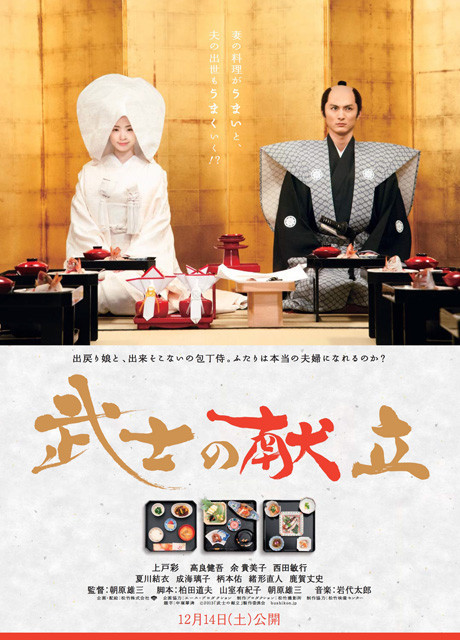A Tale of Samurai Cooking

A Tale of Samurai Cooking is loosely based on the Funaki family – loyal to the Daimyos lineage in the Kaga province – and the cooking skills they employed, establishing their worth during the tumult of feudal Japan during the Edo period.  Yasunobu, the youngest male Funaki, against his true desire to become a warrior, is designated the role of “cooking samurai”. It is decided, much to his chagrin, that he is to marry Haru (played by the beautiful Aya Ueto), a lower-class girl who has a deft touch for producing exquisite food.
Yasunobu, the youngest male Funaki, against his true desire to become a warrior, is designated the role of “cooking samurai”. It is decided, much to his chagrin, that he is to marry Haru (played by the beautiful Aya Ueto), a lower-class girl who has a deft touch for producing exquisite food.
The film’s light, fluffy tone, at first, has a charming appeal. Several of the opening scenes focus on the forced romance and Haru’s awkward attempts to impart cooking advice. The uncertainty of Yasunobu’s identity – forgotten warrior becomes useless cook – serves as the centre point of the film’s humour (denoted by musical interludes), as he becomes increasingly frustrated by his effeminate role. To complicate things, Yasunobu harbours a forlorn love for Sayo, a girl haunting his memories.
A samurai genre film subverting Japanese male identity is timely and culturally relevant. Although a period piece, it clearly emphasises the contemporary malleability of progressive gender roles. In a society known for rigid social order, male indecisiveness is creating an ideological space in modern day Japan, threatened by re-interpretation. In the throes of social suicide, it’s the core culture that comes into question. Whether the fears of Yasunobu are cultural anxieties derived from an increasingly atomistic hi-tech culture, demographic ruin, or Western ideological imperialism at work (most likely all three), it’s an interesting aside detecting present fear in period drama.
Unfortunately the film suffers from languid pacing, and while it is staged beautifully with painstaking attention to detail and the supporting cast is sturdy, the story is not immersive enough to invest in emotionally. Halfway through, the narrative begins to acknowledge its wider, historical context. When the Kaga Daimyo dies, internal rivalries threaten the peace. In response, the Funaki family plan a grand banquet to bridge animosities. At first, this revitalises the film, but its mistake becomes apparent. Leaving purposeful exposition so late into the running time, plot highlights between the focal couple are inadequately explored. After two hours of so-so drama, the audience is anything but hungry for more.
Mark Warburton
A Tale of Samurai Cooking is released in selected cinemas on 12th December 2014.
Watch the trailer for A Tale of Samurai Cooking here:
https://www.youtube.com/watch?v=AhNjF5loNSM

























Facebook
Twitter
Instagram
YouTube
RSS